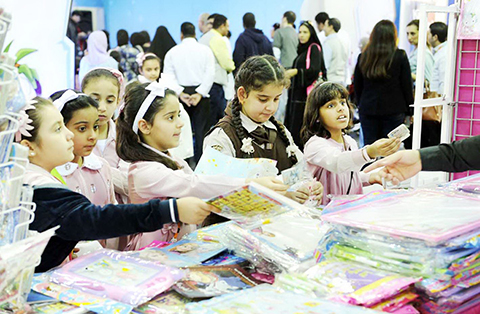 KUWAIT: As Kuwait International Book Fair is opening its doors to the public, expectations may grow on whether Children's books in Arabic would sell more this year than those of illustrated kids' books in English, especially since the latter have been hogging the markets for many years and have been the go-to choice for parents.
KUWAIT: As Kuwait International Book Fair is opening its doors to the public, expectations may grow on whether Children's books in Arabic would sell more this year than those of illustrated kids' books in English, especially since the latter have been hogging the markets for many years and have been the go-to choice for parents.
A KUNA survey concluded that 58 percent of parents encourage their kids to read in English to strengthen their command of that language since a large number of kids go to American or British schools where English is the dominant language. Even kids who do not go to these private schools, they dabble their little minds in English Children's books because of a culture based on globalization where products, movies, TV shows, magazines and little gadgets are presented in a foreign language.
Enticing presentation
Earlier this month at Sharjah International Book Fair, Kuwaiti author Hibba Meshari Hamadah said that "children in the Arab World tend to read more English kids' books because of its enticing presentation and intriguing content to the curious minds of the little ones." Children's books in English are far more interesting because they tell a short and simple story through colorful artwork that allows kids to expand their young minds through interesting poetic language, fun alliteration and advanced vocabulary.
"Arabic Children's books; however, tend to 'preach a lot' to teach kids a moral," Arabic children's books author Abir Ballan said. They are void of fun and entertainment; two elements that make books "attractive to children."
"Kids want to be entertained. They want to get excited about an adventure. They want to laugh. They want to be kids.
They don't want to hear morals all the time," Ballan explained. "In the primary years, the most vital task we (parents) have is to install the love of reading in children, not to teach through reading. Teaching information through reading will become a goal later on in life. If we don't succeed in the early stage then we miss both goals (i.e to make them become readers and learners)," she said.
Important habit
Arabic children's books author Amal Al-Randi stressed that reading is an important habit for children to acquire at a young age; hence, it is essential to provide them with books that are fun, attractive and interactive. The quality of a book is so important for each stage in the life of a child to keep the child entertained and interested in reading more books, Randi pointed out, noting that producing children's books are highly expensive and need extensive efforts.
Successful kid's books require three elements: good production, attractive illustrations and enticing narrative, Randi said. "A lack of any of these elements creates imbalance and a loss of its attractiveness to children. That is why English children's books are more appealing to the eye and the mind," she pointed out.
Both authors, Randi and Ballan, agreed that Arabic picture books have been increasing in the past 5 years and there are many serious attempts to produce children's books as good as the English ones. "We are on the right path to give Arab children rich and fun books," Al-Randi said; nonetheless, their mass production is not quite there yet.
On her part, Ballan said that Arabic illustrated books should be more "accessible in bookstores and available on digital platforms where kids can access them independently." Randi also explained that translated children's books from English into Arabic have been also increasing in the past 5 years. They take up 30 percent of the kids' books market than the ones originally written in Arabic.
This increasing tendency to translate books is due to its low production cost: less expensive payments for Arab authors and Arab illustrators, she said. However, Randi cautioned parents to watch for these translated books because might teach values and lessens that are contradictory to that of the Arab culture. - KUNA

